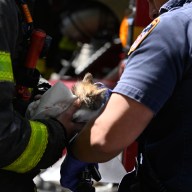Opossum oppressed southern Brooklyn continues to blame City Hall for an ill-conceived rat-eradication scheme — but the mayor and even the governor say the whole thing is a figment of a varmint-obsessed population.
What has become known as “Opossumgate” started three years ago, when a Sanitation official apparently told a packed room of Community Board 15 “town hall” meeting attendees that the city had “brought opossums in to take care of the rat problem.”
That contention was repeated in March by Councilman Domenic Recchia, who told this newspaper about the supposed ecological intervention by the city, which allegedly transported the animals to the neighborhood to gobble up rats.
The Post repeated Recchia’s tall tale tail last Sunday in a story that referred to the city’s so-called “operation opossum” as a misadventure that is now causing an opossum outbreak from Coney Island to Carroll Gardens.
There’s one flaw in the whole thing: Operation Opossum simply isn’t true.
“There is no opossum program,” said Jessica Scaperotti, a mayoral spokeswoman. “The city did not bring opossums there. They are indigenous to the northeast.”
The Department of Health echoed that sentiment, calling the concept preposterous. “The Health Department did not, does not, nor plans to release any opossums or any other wildlife to control the city’s rat population,” a spokeswoman said.
And even if it wanted to, the agency said, it is not allowed to simply truck wild animals wherever it wishes, because relocating non-domesticated fauna is regulated by the state Department of Environmental Conservation — and that agency has not written a license for such a relocation, said spokesman Thomas Panzone, who ferreted through 20 years of data looking for such a document.
But Recchia had no apologies.
“This is what the community board was told,” he said. “How did the opossums get here then?”
Recchia recounted that 2007 town hall meeting, at which Sanitation officials told Sheepshead Bay and Manhattan Beach residents that the city did indeed bring in the munching marsupials to control the rodent population.
And, yes, the minutes of that town hall meeting, kept by a member of Community Board 15, stated, “The Department of Sanitation said that the city brought possums in to take care of the rat problem.”
But Sanitation spokeswoman Kathy Dawkins said she personally spoke to one of the officials at the meeting — Enforcement Director Todd Kuznitz — and he told her this week that nothing of the kind was said at that meeting.
“It’s not true,” Dawkins said. “Sanitation has nothing to do with opossums.”
But the conspiracy theories continue. Theresa Scavo, the chairwoman of CB15, suggested that the city is just playing ’possum, desperately hoping to hide its Mickey Mouse operation.
Opossums, after all, have become a public relations nightmare, she said.
“If you were them and now you had an opossum problem, would you own up to it?” Scavo asked. “I think it was an experiment that went bad.”
Real or not, experts laughed like hyenas at the critter caper.
“Opossums are not effective rat predators,” said Dr. Robert Voss, the director of mammalogy at the American Museum of Natural History, a Manhattan institute. “If they found a dying rat, they would probably eat it, but opossums don’t move that fast and rats are very smart and very fast.”
The very idea of dispatching an army of opossums to kill rats is “ridiculous,” he added.
Opossums are generalists, eating everything from poisonous snakes to rotting trash. But biological control typically works only if the creature that’s being introduced has a highly specialized diet, for example a wasp that attacks only a certain type of caterpillar.
In nature, generalists take prey that is the easiest to acquire, not the most difficult. And for opossums, Voss said, that means choosing garbage over a grizzled sewer rat.
The introduction of animals to control pests can have mixed results. Mongooses were introduced in the West Indies to control rats and snakes, but turned out to be quite destructive, wiping out a vast array of small mammals.
So which animal would be an effective Brooklyn e-rat-icator?
“Probably something like a weasel,” Voss said.





















